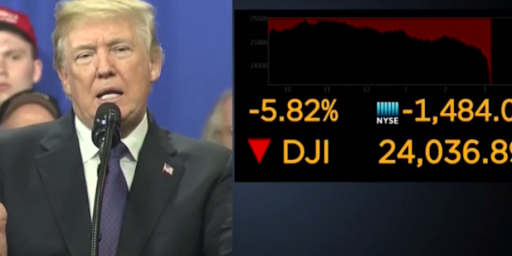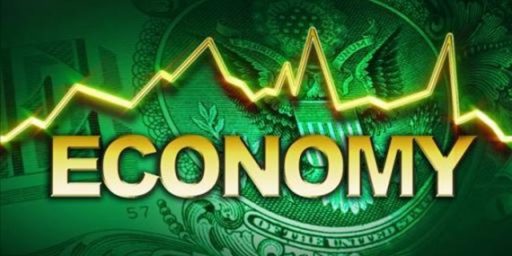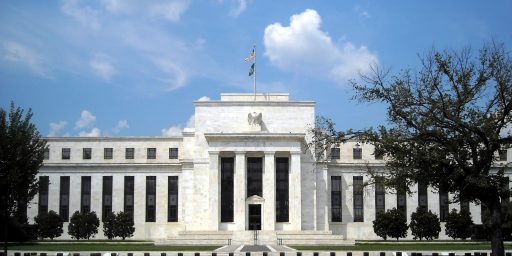Unemployment Hits 8.1 Percent
Really bad news on the jobs front:
The nation’s unemployment rate bolted to 8.1 percent in February, the highest since late 1983, as cost-cutting employers slashed 651,000 jobs amid a deepening recession.
Both figures were worse than analysts expected and the Labor Department’s report shows America’s workers being clobbered by a wave of layoffs unlikely to ease in the coming months.
“There is no light at the end of the tunnel with these numbers,” said Nigel Gault, economist at IHS Global Insight. “Job losses were everywhere and there’s no hope for a turnaround any time soon.”
Not much to say to that. A few months ago, when the economic mess was mostly confined to the financial sector, most of the hand-wringing seemed over the top. The stock market and other indicators were bad news, of course, but the core indicators that directly affect most people — interest rates, inflation, and employment — were still excellent.
Now, we’ve got record low interest rates, inflation remains quite low — indeed, there’s talk of deflation on the horizon — but truly worrisome numbers on the jobs front. One hesitates to put much stock in forecasts, given that nobody seems to have any idea what’s going on, but I fear Gault is right.





Thanks a lot B. Hussein– some type of “change”.
So now we can supect that some of the “hand wringers” were in fact rational observers. (look up d-process, and see how much was correct)
With this anti-business attitude of the Democrats, it is not surprising. Yep those evil businesses don’t want to hire anyone if they can’t make a profit. Wait until they increase energy cost with the new energy taxes for example carbon tax and increase in gas tax not the mention in impeding new exploration. Once that happens it going make today look like the good old days.
Is there a better way to make more people dependent on the Government than to exacerbate unemployment? The administration, instead of concentrating on crisis issues continues to pursue leftist policies such as nationalization of the health care system. There is a limit to the number of providers of healthcare. If it becomes the government who decides who gets the services, who loses? Everybody.
Unless the public hand-wringing has in fact fomented the conditions they were complaining about. Then it’s a self-fulfilling prophecy.
My gripe is about companies that are not highly leveraged that are laying off employees and continuing to pay dividends or, even worse, doing so to keep their dividends up. If a company is really going into survival mode, it shouldn’t be paying dividends. Why should reducing the workforce be the first line of defense?
Well,in fairness, the fiduciary responsibility of the managers is to the share holders, not the employees. Keeping people on payroll as a form of welfare when their services are (temporarily) not needed is problematic in that sense, no?
and
lol. God forbid anyone in the blogosphere admit error.
And, as is typical from the right, actual human beings are forgotten. These companies that are being bailed out – who exactly is going to buy the things they manufacture? Even if all of the GOP’s wet-dream business-friendly policies were enacted, Americans would not be hired in sufficient numbers or at sufficient salary to actually _buy_ a lot of unnecessary consumer goods. Even if banks started offering credit again to anyone who could sign their own (or anyone’s) name to an app, regular citizens don’t want credit. They want jobs. With salaries that can actually support their families, rather than minimum-wage non-careers. And those things aren’t in the market in any great numbers now, or in the foreseeable future.
Basically, all of the companies that are currently begging for bailouts will be bankrupt again in 2-5 years, mark my words. Why? Because they won’t change their basic business concepts, which are not built around making the best product for the lowest price, but for making the crappiest products at the highest profit margin. Why is that an important distinction? And what does it have to do with this thread? Because it still means hiring as few workers as possible. And paying them as little as you can get away with. And that means the economy will not improve.
And yes, if other countries have lower standards of living than us, they’ll have lower labor costs too – there’s not really anything to be done about that short of protectionism. Or – gasp – competing with quality over quantity. And this means Deflation is coming. There’s no avoiding it. We can either deal with it in policy, or we can put our heads in the sand and be further devastated when it arrives.
@Dave:
And @Bernard:
I once, many years ago, had the very great good fortune to have a long conversation with Milton Friedman and his wife (which formed the basis of a magazine article I published). The conversation was wide-ranging. I rememember his saying that a corporation is a cooperative arrangement among management, employees, and customers. And I recall thinking at that time, “But sir, it’s the employees, in the end, who are asked to do all the cooperating.”
If you’d read the posts on my blog on this subject, Bernard, you’d see that management’s fiduciary responsibility is one of my favorite topics in this regard. Management’s fiduciary responsibility is in maximizing shareholder equity, not maximizing the dividend. Liquidating the company in the interests of maintaining the dividend is an abrogation of management’s responsibility, not realizing it.
Unless the company is one whose employees are mostly unskilled, retaining its employees is one of a company’s most important challenges. There are approaches other than cutting jobs, e.g. mandatory unpaid vacation, other forms of pay cuts, and job-sharing to maintain the workforce while reducing payroll costs. Cutting jobs in the current circumstances isn’t a benign act and, in my view, should be a last resort rather than a firs one.
And that reminds me of a story that Saul Alinksy used to tell. Seems there was some labor strife at a plant in the Midwest. After a strike and some more unpleasantness, the union and management finally struck a deal. The only catch was, the union vote had to be unanimous, and one guy was holding out. The guy’s fellow workers couldn’t budge him, this shop steward couldn’t budge him, even his wife couldn’t budge him. Finally, the boss called the guy into his office and told him that if he didn’t sign the agreement, he’d be fired. The guy signed right away. The boss was dumbfounded. He said, “What’s this? Your buddies, your union leadership, even your wife couldn’t get you to sign. I talk to you for two minutes and you sign right away. What’s up with that?” The guy said, “Well, you see, sir, before I spoke to you, no one had explained it to me.”
Fair enough.
I am going to be even-handed here:
All of us are human, and suffer from well-know cognitive biases. One of the most well known and most applicable to “problem identification” is confirmation bias.
It’s a little unfair to all us humans, when you think about it, but we will divide and some of us will be more willing to see new problems than others. It depends on whether the problem, as it appears on the horizon, fits our mental landscape.
Bush was talking up the success of his economy. A certain set of people were inclined to doubt that success, and so they were more open to the possibility of failure.
The important thing to remember, if we want to overcome bias, is that sometimes we are in the lucky group, and sometimes we are not. We have to stand ready to step outside ourselves, to see if we “like” a problem or “dislike” it, for the wrong reasons.
(FWIW, when I try that, step outside myself … I call BS on the “self-fulfilling prophecy” stuff. YMMV, but I’d suggest you try this mental experiment: Do you actually equally weight both sides of the pendulum swing? Do you deride irrational exuberance equally with irrational panic? They are two sides of the same coin. You cannot rationally accept one without the other.)
Lost in the various themes here seem to be two points:
1) Many businesses use the event of economic downturn as the catalyst (excuse?) to eliminate the least desirable employees. Its the least expensive and most logical time to do so. Its not simply a dividend / employment trade off.
2) I would observe that this recession is unfolding just like a good harsh recession does – like a 1975 or 1981 style recession. 2-3 quarters of 1- 1.5% GDP contraction with escalating unemployment. We are smack in the middle of this process. That makes this neither the end of the world, nor a non-event, just something different and harsher from the light 1991 and 2001 recessionary frame of reference experienced by everyone under the age of about 48.
However, I’ll start wringing my hands pretty soon if this President doesn’t take his focus off his political agenda soon, and get to the serious business of the banking system. Neither this rookie President or the tax cheat Secy of Treasury seems to have a clue right now. And that’s how you could have a disaster.
I’d say this is a perfect example of human social nature. Companies that might like to trim employees don’t do so when it would signal unfairness or weakness. They take advantage, consciously or not, of a changed environment to do what they really want to do.
Yikes! Writing at the same time as Drew, we see our overlap again.
I’ll ignore his last paragraph for my own sanity.
There have been decades of studies and anecdotal experience that suggest that’s not what happens. Actually, it’s quite the opposite especially when you consider the commonplace approach these days of buyouts (in various forms). It’s the most desireable (and portable) employees that take the buyouts.
I think that’s a pretext rather than a reason. To make it work takes strong management which I see as the exception rather than the rule.
“Yikes! Writing at the same time as Drew, we see our overlap again. I’ll ignore his last paragraph for my own sanity.” ;->
Sanity is over rated.
I would be interested in your views (anyones views) on Geithner’s Japan experience and rumors he thinks we are headed right down that path.
Dave –
I suppose we are all, to a degree, prisoners of our personal experiences. However, 30 years now of being an employee (15 years) and as an owner/investor (15 years) in multiple businesses leads me to different conclusions. I didn’t want to be too crude in my former comment, but its simply a thinning of the herd approach. And I’ve seen it over and over; and spoken with many business owners/managers who do/think just what I say.
Your reference to buyouts may be important here. That generally is a large corporate activity. My world is smaller businesses. Of course, that’s where the jobs are.
Geithner’s or, at least, the Administration’s insistence on preserving the banks’ balance sheets certainly seems like it’s moving us down Japan’s path. One of its hallmarks was the preservation of zombie banks.
I’ve already suggested that I think we’re headed for a Japan-style L-shaped recession. No recovery means no job growth which means people laid off now could be out of work for a long, long time.
OK Drew, on a second reading, if I skip the bit about Obama’s politics being the driver, I can buy it.
The problem is regulatory capture by the financial community of government. It’s a little too much “government by Wall Street, for Wall Street” than anything conventionally partisan, IMNSHO
From the quoted article (Yahoo News):
Potential solutions to these dire predictions were not offered by our host or most of the correspondents. It is as easy as falling off a log, appose the stimulus packages advanced by the Obama administration, and recommend further tax cut for the wealthy. Just make sure the log you are sitting on is not over the vortex of a downward spiral.
A round of applause for Dave Schuler for his comment (March 6, 2009 | 11:58 am) that management does have responsibilities to the work force.
As for Zelsdorf Ragshaft III ( 11:33 am) post he should not fret about his future transportation needs. They will be provided by those automakers whose workers health care needs are covered by single payer, government sponsored health care (aka socialized medicine).
Odo –
“The problem is regulatory capture”
No argument. I was about 16 – 17 years old when Friedmans’s “Free to Choose” came out, and he pointed out that the entire history of regulation is one of industry execs migrating into the regulatory infrastructure, and……..well, I would insult your intelligence with the rest.
Why do we continue to believe in heavy regulation?
I’ve always said that I prefer a lightly regulated market economy. I think that’s generally what we have, though there are those who would try to drag the line one way or the other.
I do think it’s clear that our lightly regulated banking system was insufficiently regulated … oversight certainly did not balance the rumored $9 trillion in guarantees we’ve made to keep it afloat.
I also prefer clear delineation between what is market and what is government (what is public and what is private). I think most people are more comfortable with half-and-half programs than I am, with: public universities who own patents, or faith-based-initiatives funded by government.
To me the disentanglement is as important as the size.
Those of us who read Krugman knew the economy was shitty.
The AIG cataclysm was largely the result of an insurance product (credit default swaps) which, not being regulated like an insurance product, could be issued by any undercapitalized fly-by-night operation that came along.
It’s no surprise that the two financial implosions of the last 100 years immediately followed periods of significant financial deregulation.
There’s a reason NASCAR uses restrictor plates. It reduces the carnage.
Certainly. You can just look around the world and see that no regulation or extreme regulation produce unpleasant conditions. And I think most people understand that, a few Communists and Randroids aside.
Because paying dividends keeps the shareholders happy, who then throw even huger mountains of cash at the top execs, who then can buy even bigger Gulfstreams. Nobody cares about the guy at the bottom. One horrible publicly-traded company I worked for in 2006 didn’t even refer to them as employees or people. They called them ‘resources’. As in “We need to increase productivity to offset the change in internal resources.” Actual sentence my new manager used around me. Translates to “We need you guys to work harder since we just fired a quarter of the staff to make The Street happy.” It was a terrible company, and I resigned a few weeks later. I wasn’t going to do 33% more work for the same pay just to inflate the CEO’s bonus.
Cutting employees is often regarded as positive news by the Street. Because the Street is myopic and doesn’t see past next quarter.
MSFT is often mentioned as a takeover target because they spend a few billion dollars on R&D which doesn’t pay off for years. So various people would like to buy them up, shutter the R&D department, use the savings to boost the bottom line, then sell the ‘more profitable’ company off at a premium. Who cares if you destroy the long-term future of the company. Next quarter looks awesome!